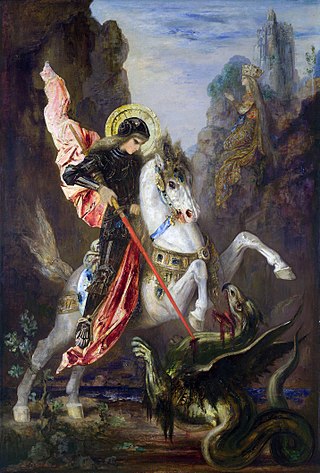
Christian mythology is the body of myths associated with Christianity. The term encompasses a broad variety of legends and narratives, especially those considered sacred narratives. Mythological themes and elements occur throughout Christian literature, including recurring myths such as ascending a mountain, the axis mundi, myths of combat, descent into the Underworld, accounts of a dying-and-rising god, a flood myth, stories about the founding of a tribe or city, and myths about great heroes of the past, paradises, and self-sacrifice.
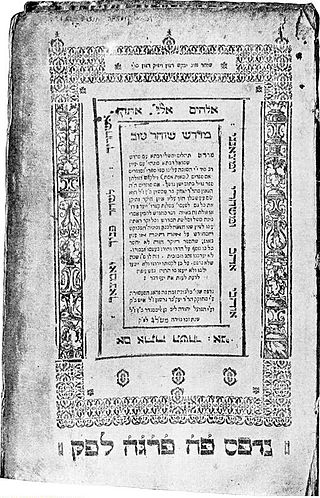
Midrash is expansive Jewish Biblical exegesis using a rabbinic mode of interpretation prominent in the Talmud. The word itself means "textual interpretation", "study", or "exegesis", derived from the root verb darash (דָּרַשׁ), which means "resort to, seek, seek with care, enquire, require", forms of which appear frequently in the Hebrew Bible.
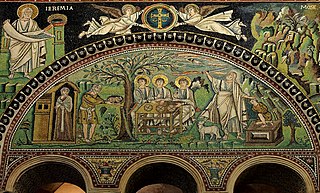
The Binding of Isaac, or simply "The Binding", is a story from Genesis 22 of the Hebrew Bible. In the biblical narrative, God orders Abraham to sacrifice his son Isaac at Moriah. As Abraham begins to comply, having bound Isaac to an altar, he is stopped by the Angel of the Lord; a ram appears and is slaughtered in Isaac's stead, as God commends Abraham's pious obedience.

In Judaism and Christianity, the tree of the knowledge of good and evil is one of two specific trees in the story of the Garden of Eden in Genesis 2–3, along with the tree of life. Alternatively, some scholars have argued that the tree of the knowledge of good and evil is just another name for the tree of life.

Exegesis is a critical explanation or interpretation of a text. The term is traditionally applied to the interpretation of Biblical works. In modern usage, exegesis can involve critical interpretations of virtually any text, including not just religious texts but also philosophy, literature, or virtually any other genre of writing. The phrase Biblical exegesis can be used to distinguish studies of the Bible from other critical textual explanations.

The Nephilim are mysterious beings or people in the Hebrew Bible who are described as being large and strong. The Hebrew word Nephilim is sometimes translated as "giants", and sometimes taken to mean "the fallen ones". Their origins are disputed. Some view them as offspring of fallen angels and humans. Others view them as offspring of the descendants of Seth and Cain.

Forbidden fruit is a name given to the fruit growing in the Garden of Eden which God commands mankind not to eat. In the biblical story, Adam and Eve eat the fruit from the tree of the knowledge of good and evil and are exiled from Eden:
And the Lord God commanded the man, saying, Of every tree of the garden thou mayest freely eat:
But of the tree of the knowledge of good and evil, thou shalt not eat of it: for in the day that thou eatest thereof thou shalt surely die.
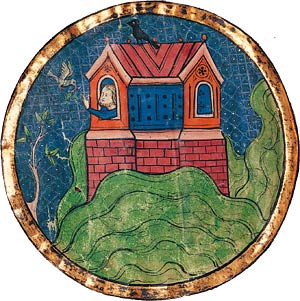
In the Book of Genesis, the mountains of Ararat is the term used to designate the region in which Noah's Ark comes to rest after the Great Flood. It corresponds to the ancient Assyrian term Urartu, an exonym for the Armenian Kingdom of Van.

Beryl Smalley (1905–1984) was an English historian best known for her work The Study of the Bible in the Middle Ages, originally published in 1941, but revised many times, a book that laid the foundations of modern study of the medieval popular Bible.
Biblical literalism or biblicism is a term used differently by different authors concerning biblical interpretation. It can equate to the dictionary definition of literalism: "adherence to the exact letter or the literal sense", where literal means "in accordance with, involving, or being the primary or strict meaning of the word or words; not figurative or metaphorical".
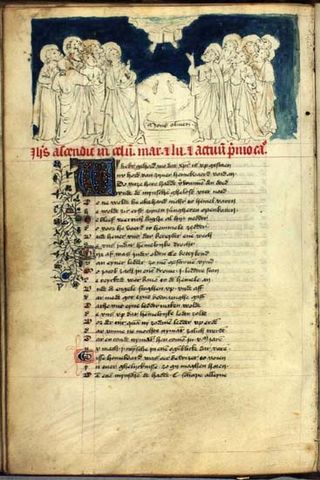
Typology in Christian theology and biblical exegesis is a doctrine or theory concerning the relationship of the Old Testament to the New Testament. Events, persons or statements in the Old Testament are seen as types prefiguring or superseded by antitypes, events or aspects of Christ or his revelation described in the New Testament. For example, Jonah may be seen as the type of Christ in that he emerged from the fish's belly and thus appeared to rise from death.
Petrus Comestor, also called Pierre le Mangeur, was a twelfth-century French theological writer and university teacher.
In hadith studies, Israʼiliyyat are narratives assumed to be of foreign import. Although indicating such stories develop from Jewish sources, narratives designated as Isra'iliyyat might also derive from other religions such as Christianity or Zoroastrianism. Isrā'īlīyāt were received varyingly by both early and later Muslim scholars, with early prophetic traditions criticising their details yet encouraging their transmission. Many pre-modern scholars enthusiastically used them, while many Arab scholars in modern times have called them unislamic.
The Glossa Ordinaria, which is Latin for "Ordinary [i.e. in a standard form] Gloss", is a collection of biblical commentaries in the form of glosses. The glosses are drawn mostly from the Church Fathers, but the text was arranged by scholars during the twelfth century. The Gloss is called "ordinary" to distinguish it from other gloss commentaries. In origin, it is not a single coherent work, but a collection of independent commentaries which were revised over time. The Glossa ordinaria was a standard reference work into the Early Modern period, although it was supplemented by the Postills attributed to Hugh of St Cher and the commentaries of Nicholas of Lyra.

Adam and Eve, according to the creation myth of the Abrahamic religions, were the first man and woman. They are central to the belief that humanity is in essence a single family, with everyone descended from a single pair of original ancestors. They also provide the basis for the doctrines of the fall of man and original sin that are important beliefs in Christianity, although not held in Judaism or Islam.
Brian Oliver Murdoch is a British philologist who is Emeritus Professor of German at the University of Stirling. He specializes in the study of early Germanic and Celtic literature, on which he has authored and edited several influential works.
The Legend of the Rood is a complex of medieval tales loosely derived from the Old Testament.
Christopher Ocker is a historian and Professor of Medieval and Early Modern Studies at the Institute for Religion and Critical Inquiry in the Australian Catholic University, Melbourne. He is also professor of the history of Christianity at San Francisco Theological Seminary; a member of the Core Doctoral Faculty of the Graduate Theological Union in Berkeley; series editor of Studies in Medieval and Reformation Traditions, and a co-editor of Arbeiten zur Kirchengeschichte. He served as Interim Dean of SFTS and Assistant Provost of the Graduate School of Theology in the University of Redlands from 2021 to 2023. Ocker is known for his work on the history of religion in Europe, Medieval and early modern intellectual and cultural history, and the social and political history of late medieval and early modern Central Europe.
William of Luxi, O.P., also Guillelmus de Luxi or, was born in the region of Burgundy, France, sometime during the first quarter of the thirteenth century. He was a Dominican friar who became regent master of Theology at the University of Paris and a noted biblical exegete and preacher.










